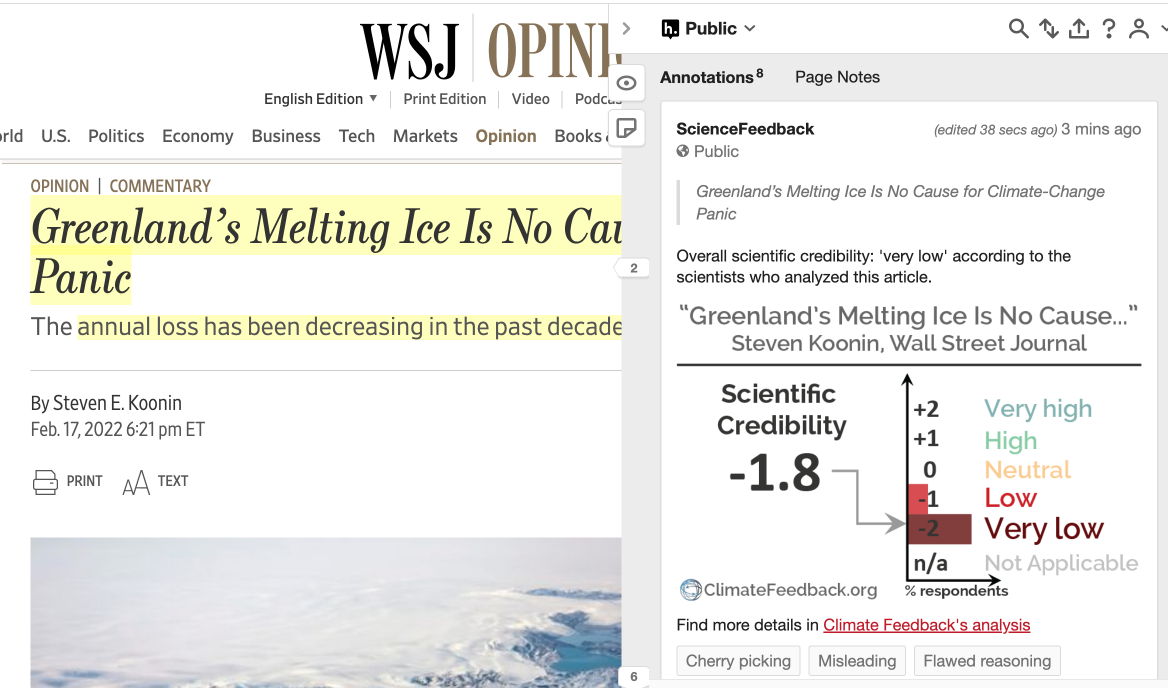- Climate
Global sea level rise is accelerating, despite Heartland Institute report’s claims otherwise
Key takeaway
Globally, sea level is rising due to melting glacial ice and warming oceans, and the current rate of sea level rise is faster than past rates.
Reviewed content

Verdict:
Claim:
Best available data show sea-level rise is not accelerating. Local and regional sea levels continue to exhibit typical natural variability—in some places rising and in others falling.
Verdict detail
Factually Inaccurate: The observed rate of global sea level rise has increased in comparison to preceding decades or centuries.
Fails to Grasp Significance of Observation: Local sea level change can differ from the global average because of land surface elevation trends or ocean circulation variability, but these additional local factors are not indicative of the global sea level trend.
Full Claim
Best available data show sea-level rise is not accelerating. Local and regional sea levels continue to exhibit typical natural variability—in some places rising and in others falling.

Professor, Earth Observatory of Singapore
False. Comparison of long tide gauge records and multi-centennial to millennial scale sea-level reconstructions from the same region indicates that the rate of rise during the instrumental period (since ~1850 CE) was significantly faster than it was during the late Holocene (the 4000–2000 years prior to ~1850 CE). The data demonstrate that an acceleration in the rate of sea-level rise occurred.
- Kopp et al (2016) Temperature-driven global sea-level variability in the Common Era, Proceedings of the National Academy of Sciences
[the article concludes: “A significant global sea level acceleration began in the 19th century and yielded a 20th century rise that is extremely likely (probability P ≥ 0.95) faster than during any of the previous 27 centuries.”]

Climate Scientist, University of California, Los Angeles
This statement is false. A wide range of direct measurements (i.e. tidal gauges) and indirect measurements (i.e., gravity monitoring satellites) show that the rate of sea level rise has increased (i.e., accelerated) in recent years*.
- Dieng et al (2017) New estimate of the current rate of sea level rise from a sea level budget approach, Geophysical Research Letters
[the article concludes: “An important increase of the global mean sea-level rate is found during the second half of the altimetry era (2004–2015) compared to the 1993–2004 time span, mostly due to Greenland mass loss increase and also to slight increase of all other components of the budget.”]

Professor, Lamont-Doherty Earth Observatory, Columbia University, and Director, Center for Climate and Life
This is untrue. The best available data show that the rate of sea level rise has more than doubled in just the last decade*.
- Hay et al (2015) Probabilistic reanalysis of twentieth-century sea-level rise, Nature

Postdoctoral researcher, Los Alamos National Laboratory
Use of “accelerating” is misleading. Even if the rate wasn’t accelerating (which it is), the fact of a steady rise would still be important.
Global average sea level is unambiguously rising. Regions where sea level is falling are regions where local sea level signals are large enough to counteract the global trend—for example, in Baffin Bay and parts of Scandinavia, where continued residual land uplift is continuing, associated with the unweighting of the land from loss of last glacial maximum ice sheets.
More details on why local sea level changes can differ from global change can be found in the IPCC report, chapter 13.
A recent study finds that sea-level rise recently accelerated significantly, the rate between 1993 and 2012 being three times faster than the rate before 1990*.
- Dangendorf et al (2017) Reassessment of 20th century global mean sea level rise. Proceedings of the National Academy of Sciences



